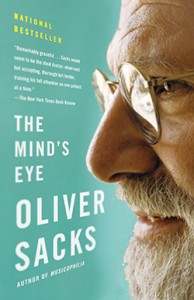The author of The Mind’s Eye., Oliver Sacks, is a neurologist who has written books on the various senses, brain function and dysfunction and perception. He makes challenging, vague  topics more obtainable to the layperson.
topics more obtainable to the layperson.
The Mind’s Eye is about different visual perception related conditions ranging from agnosia (inability to recognize and name objects), stereopsis, and peripheral vision.
Of the seven different topics/chapters my favorites were “Stereo Sue” and “Persistence of Vision.” Susan Barry is a neuroscientist who had been cross-eyed since infancy. Susan had strabismic surgery as a child to straighten her eyes but lacked fusion, the 2 eyes didn’t work together.She grew up viewing a flat world until she finally met an optometrist who created a vision training program for her. Due to her motivation and interest in perception she succeeded in obtaining stereo vision. Her two-dimensional world became three-dimensional. She has written a book about her journey into three dimensions – Fixing My Gaze. If you are interested in stereopsis, have a strabismic child or lack depth perception yourself I strongly recommend her book.
“Persistence of Vision” is a journal of Oliver Sacks’ own experience slowly losing vision in one eye due to a tumor. He scolds himself for missing his annual eye exams which would have detected the tumor earlier. Losing his vision in one eye caused the loss of stereovision and peripheral vision. As a neurologist, Sacks analyzes not only the loss of peripheral vision but the loss of awareness in the visual field. He had to learn to deal with moving around without awareness of objects to his right, this resulted in a lot of bruises on the right side of his body.
In the first pages of the book, Sacks describes the human variation in visual imagery, peoples ability to visualize something without actually seeing it. At the end of the book he gives examples of individuals who have profound enhancement of the remaining senses when one is lost and other individuals who don’t gain sensitivity. The one consistent factor of the brain and human perception is that it isn’t consistent.
My one complaint of the book is the footnotes on nearly every page. By the end of the book I was annoyed to the point where I had to ignore the footnotes to finish reading the text.